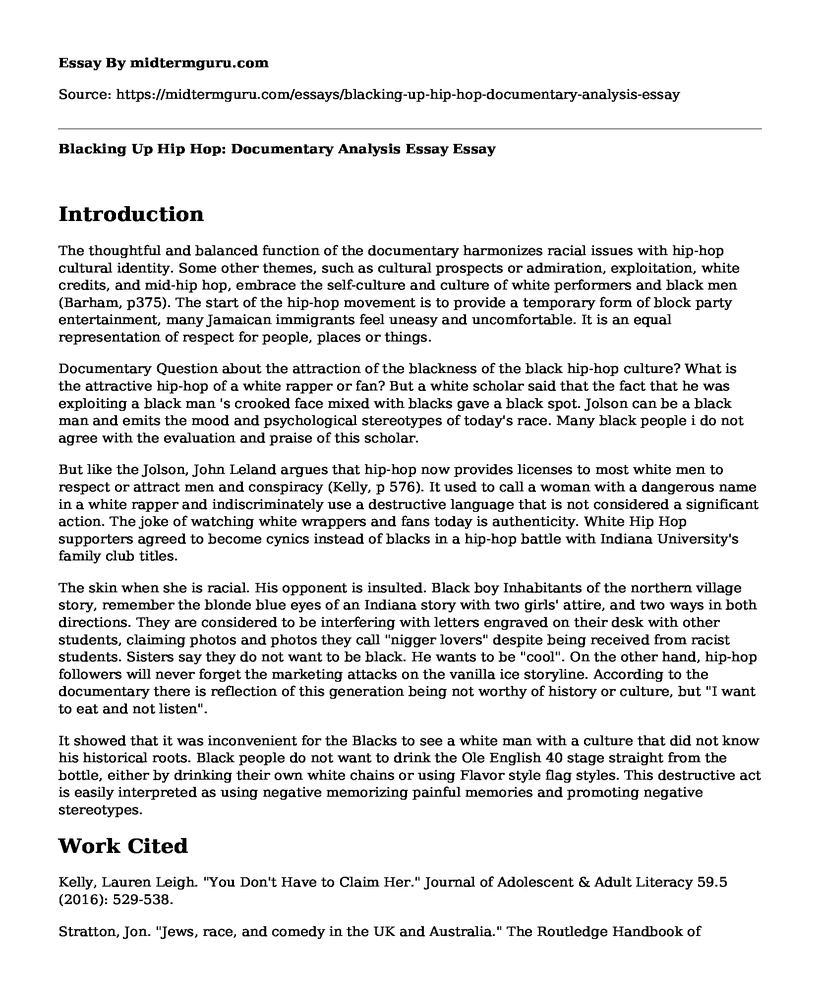Introduction
The thoughtful and balanced function of the documentary harmonizes racial issues with hip-hop cultural identity. Some other themes, such as cultural prospects or admiration, exploitation, white credits, and mid-hip hop, embrace the self-culture and culture of white performers and black men (Barham, p375). The start of the hip-hop movement is to provide a temporary form of block party entertainment, many Jamaican immigrants feel uneasy and uncomfortable. It is an equal representation of respect for people, places or things.
Documentary Question about the attraction of the blackness of the black hip-hop culture? What is the attractive hip-hop of a white rapper or fan? But a white scholar said that the fact that he was exploiting a black man 's crooked face mixed with blacks gave a black spot. Jolson can be a black man and emits the mood and psychological stereotypes of today's race. Many black people i do not agree with the evaluation and praise of this scholar.
But like the Jolson, John Leland argues that hip-hop now provides licenses to most white men to respect or attract men and conspiracy (Kelly, p 576). It used to call a woman with a dangerous name in a white rapper and indiscriminately use a destructive language that is not considered a significant action. The joke of watching white wrappers and fans today is authenticity. White Hip Hop supporters agreed to become cynics instead of blacks in a hip-hop battle with Indiana University's family club titles.
The skin when she is racial. His opponent is insulted. Black boy Inhabitants of the northern village story, remember the blonde blue eyes of an Indiana story with two girls' attire, and two ways in both directions. They are considered to be interfering with letters engraved on their desk with other students, claiming photos and photos they call "nigger lovers" despite being received from racist students. Sisters say they do not want to be black. He wants to be "cool". On the other hand, hip-hop followers will never forget the marketing attacks on the vanilla ice storyline. According to the documentary there is reflection of this generation being not worthy of history or culture, but "I want to eat and not listen".
It showed that it was inconvenient for the Blacks to see a white man with a culture that did not know his historical roots. Black people do not want to drink the Ole English 40 stage straight from the bottle, either by drinking their own white chains or using Flavor style flag styles. This destructive act is easily interpreted as using negative memorizing painful memories and promoting negative stereotypes.
Work Cited
Kelly, Lauren Leigh. "You Don't Have to Claim Her." Journal of Adolescent & Adult Literacy 59.5 (2016): 529-538.
Stratton, Jon. "Jews, race, and comedy in the UK and Australia." The Routledge Handbook of Contemporary Jewish Cultures (2017): 224.
Barham, Jeremy. "The Glorious Afflictions of Jazz on Screen." The Routledge Companion to Screen Music and Sound (2017): 375.
Cite this page
Blacking Up Hip Hop: Documentary Analysis Essay. (2022, Sep 20). Retrieved from https://midtermguru.com/essays/blacking-up-hip-hop-documentary-analysis-essay
If you are the original author of this essay and no longer wish to have it published on the midtermguru.com website, please click below to request its removal:
- Essay on Sure Thing by David Ives, Shawn Amaros Version
- South African Historical and Contemporary Art and Architecture - Paper Example
- Paper Example on Upgrading the Decor of Persuade Cafe
- How Social Media Has Impacted Our Culture? - Essay Sample
- Vincent Van Gogh's Starry Night Over the Rhone: Iconic Painting of Arles - Research Paper
- 18th Century Photography: American Inventors' Contributions - Essay Sample
- Social Media: Benefits and Limitations of a Digital Revolution - Research Paper







